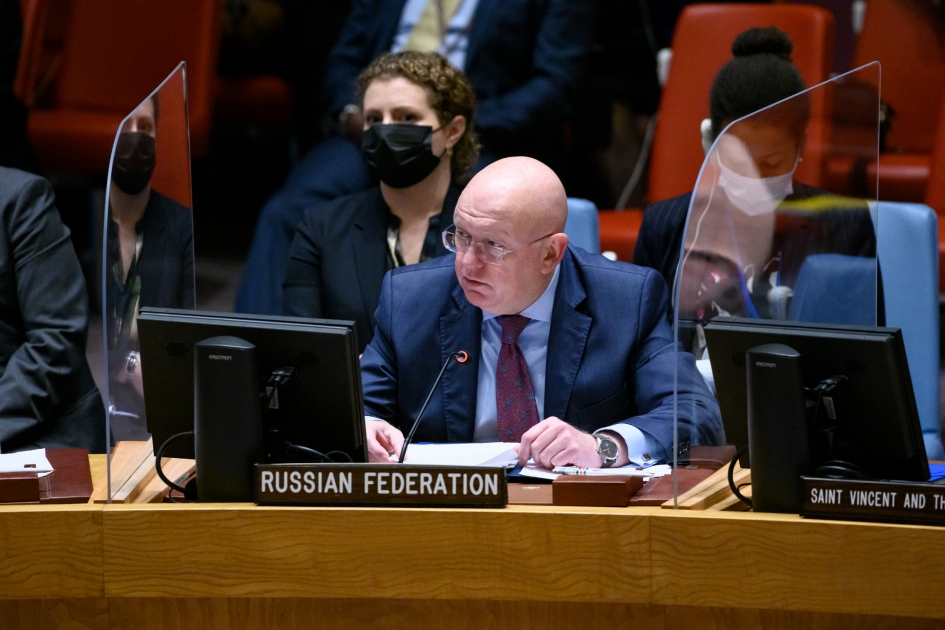Statement by Permanent Representative Vassily Nebenzia at UNSC open debate "Peacebuilding and sustaining peace: diversity, state building and the search for peace"
Mr.President, we welcome you to this meeting of the Security Council.
We thank President of Rwanda Paul Kagame, former president of the South African Republic Thabo Mbeki, and Ms. Fawzia Koofi for their statements.
To us, it was especially important to hear from you – leaders of the countries that passed through challenging periods of conflict. Your knowledge and expertise is vital to those who find themselves amid of a crisis today or have to deal with its reminiscence and consequences.
We thank Secretary-General A.Guterres for sharing his assessments.
We welcome the way the Kenyan Presidency put a question of interlinkage of diversity, state building and the search for peace. Indeed, many conflicts have to do with religious, ethnic, and religious differences; and may be provoked by social inequality.
Unfortunately, on the African continent there are still many such conflict spots that occurred due to objective historical reasons. The heavy burden of Africa’s colonial past disrupted the natural historical process of state building, borders were drawn arbitrarily, and many peoples turned out divided or, on the opposite, arbitrarily united in state formations.
Such policies, as well as the many-year long practice of imposing languages and customs alien to the local population, could not but contribute to the occurrence of interfaith and interethnic conflicts. Some colonial empires deliberately produced artificial dividing lines, cherishing hope to preserve their influence in the spirit “divide and conquer”. In parallel to this, economic exploitation of those regions was taking place.
All this did not contribute to emergence in many countries of truly cohesive societies, united by common history and culture, as well as strong states that are the key to preventing conflicts and resolving disputes.
Unfortunately, today we see certain socio-political models being imposed on the already sovereign countries. Should they act independently, or violate certain "rules", they become exposed to unilateral sanctions, trade wars and even violent "regime change”.
We have repeatedly witnessed situations when convening of elections was listed among criteria to assess progress made by states on their way towards internal political stability, as if elections per se were a cure-all solution. Thereby, many fundamental issues that raise discords in the society may be left unattended for years on end.
At the same time, we have also seen opposite situations in some states, where illegal change of power took place, but it received no negative reaction and even won some support.
The concept of transitional justice also has proven ineffective. It is not rare that special courts only exacerbate the existing contradictions. It happens when they are used to consolidate the victory of one side of the conflict over the other, settle political scores, as well as for foreign powers’ intervention in the internal affairs of states that are weakened by conflict.
We are convinced that post-conflict life must build upon local traditions and specifics: sometimes it only takes the work of a Truth Commission to achieve lasting reconciliation, whereas in other instances it may take “traditional mechanisms”, e.g. “gacaca” courts in Rwanda. Issues of transitional justice on the Security Council agenda are not the search for a “universal formula”, but rather engagement with concrete country-specific situations.
Mr.President,
We appreciate the contribution of peacekeeping and special political missions that help ensure peace and stability in conflict-affected countries, hold broad mandates and possess abundant resources. They largely contribute to putting an end to violence, protecting civilians, promoting political processes, mediation, and good offices.
This however cannot substitute for national political decisions and the process of state building based on own interests and priorities.
What’s needed is a well-advised national policy strategy that should rest on civic patriotism. Each person, no matter what ethnic or religious group they belong with, first and foremost must be a citizen of their country and take pride in it. No one may put ethnic or religious distinctions above the state’s laws. But those laws must account for ethnic and religious features of the people.
Respect for history, launch of national education programs, reach-out to the youth, elaborating state policy aimed at creating responsible power authorities and security sector – all this is the key to having a stable state and a society that realizes its share of responsibility for peace and stability.
This will inevitably result in building national identity to account for a diversity of social groups, cultural and civilizational values and historic specifics. This is a complex and long-lasting process that should flow naturally, without imposing any ready-made solutions by third parties.
We do not mean to mentor anyone, because Russia itself is a multi-ethnic and multi-religious state that has seen some hard times of its history. We respect every nation’s right to choose its own path of development, and stand ready to share our vast experience of peaceful co-existence of civilizations, cultures, and religions.
We support the aspirations of states to achieve prosperity and security of people by their own efforts given assistance of neighbors and regional integrative associations. In particular, we commend efforts of the African Union and African states aimed at building an inclusive and versatile African community, united in its identity as a part of humanity’s common history and culture.
Thank you.
